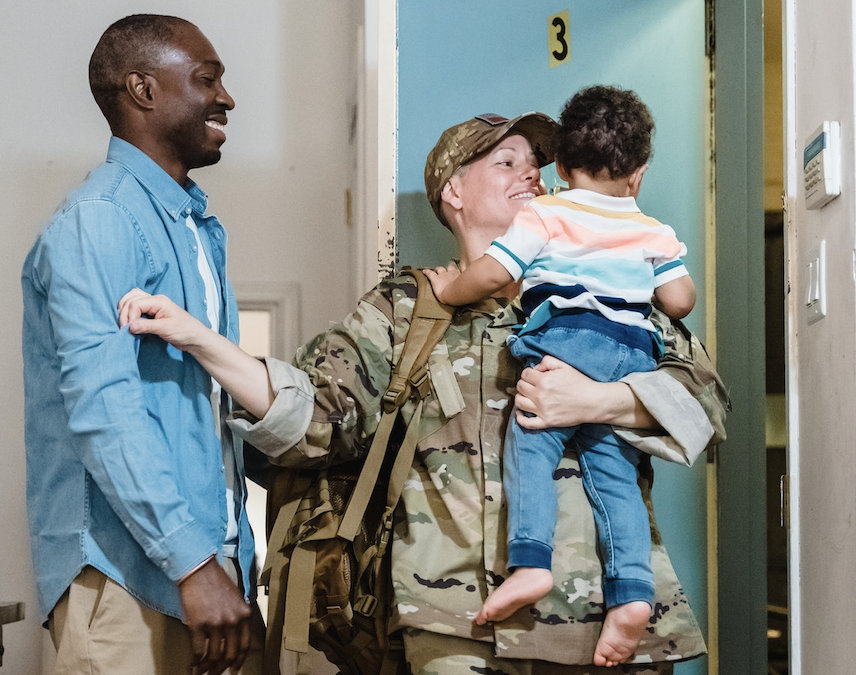Military service can pose a number of challenges for a marriage. These challenges can be both practical and emotional, and they can put a strain on even the strongest relationships.
According to 2019 statistics provided by the U.S. Department of Defense, approximately 50% of service members are married. Of that 50%, at least 7% of personnel are in dual-military marriages – that is, both members are active and serve in the military.
While all marriages experience their own ups and downs, there are some unique challenges for military marriages. Some of the practical challenges that service members and their spouses face include:
- Deployments: Military members are often deployed for extended periods of time, which can mean months or even years of separation from their spouse. This can be difficult for both partners, as they must adjust to living apart and missing out on important milestones in each other’s lives.
- Frequent moves: Military families often move frequently, which can disrupt their lives and make it difficult to maintain friendships and connections. This can also be stressful for children, who may have to change schools and make new friends on a regular basis.
- Long hours and irregular schedules: Military members often work long hours and have irregular schedules, which can make it difficult to find time for their spouse and family. This can lead to feelings of resentment and isolation, as well as a lack of communication and intimacy.
In addition to practical challenges, there are emotional challenges of military marriage, as well. Those can include:
- Fear and anxiety: Military spouses often worry about their loved one’s safety, especially when they are deployed. This can lead to feelings of fear, anxiety, and depression.
- Service-related stressors: Military members can experience trauma as part of their duties (e.g., combat, vehicle accidents, loss of fellow service member) which are difficult to talk about and share with a partner.
- Loneliness and isolation: Military spouses may feel lonely and isolated, especially when their partner is deployed. They may also feel like they are missing out on important experiences with their spouse and children.
- Financial strain: Although in recent years, there has been significant improvement in salary and benefits (e.g., housing allowance, insurance), military families often experience financial strain which then leads to stress and tension in the marriage. The financial strain can be further compounded by the fact that it is often difficult for a civilian spouse to secure a job due to frequent moves and/or deployments by the military member.
- Changes in roles and responsibilities: Military marriages often require partners to take on new roles and responsibilities. For example, the spouse who is not in the military may have to take on more of the household chores and childcare duties. This can lead to role strain and conflict.
How to Cope with the Challenges of Military Marriage
There are a number of things that military couples can do to cope with the challenges of military marriage. These include:
- Learning to communicate effectively: Communication is essential for any successful relationship, but it is especially important for military couples. Military spouses need to be able to communicate openly and honestly with their partners about their fears, concerns, and needs.
- Validating each other even during disagreements – Partners will not always agree with each other, but learning to validate how the other person is feeling is an important skill for couples. It shows that you are truly listening to the other person and are attempting to understand the other person’s feelings, even if you disagree.
- Finding ways to connect: Military couples need to find ways to stay connected, even when they are apart. This could involve talking on the phone, video chatting, writing letters, sending care packages, watching movies together, etc.
- Building intimacy in your relationship: Intimacy is that sense of closeness that a couple feels for each other. We develop that closeness by sharing ideas, feelings, experiences, and physical touch.
Conclusion
Military couples who are willing to communicate effectively, support each other, and seek professional help can overcome the challenges and build a strong and lasting relationship. The military recognizes that the commitment to serve can be stressful on both servicemen and women and their spouses. There are a number of resources that are available
Here are some additional resources for military couples:
- Military OneSource: Military OneSource is a free resource for military families that offers counseling, financial assistance, and other services.
- Military and Family Life Counselor (MFLC) Program: this program offers counselors who provide free, confidential services in a flexible manner — around duty hours and on or off the installation.
- The National Military Family Association: The National Military Family Association is a non-profit organization that provides support and resources to military families.
- The Military Spouse Magazine: The Military Spouse Magazine is a magazine that provides information and support for military spouses.
If you are a military spouse and you are struggling with the challenges of your marriage, please know that you are not alone. At Family & Child Development, all of our therapists are trained to work with couples and have experience helping servicemen and women and their partners. Please feel free to reach out to us at 850.862.3772.

